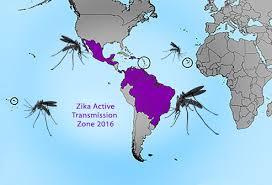Every few years it seems a new virus captures the public's attention. Over a decade ago it was SARS which had people in Hong Kong wearing masks, then it was avian flu, then H1N1, then the West Nile virus, and then Ebola and now, it is Zika.

We don't know for certain why a new virus emerges, but I can speculate. More on this later but first let me share what we know about the Zika virus.
Over a half century ago, Zika virus was discovered in Africa (I found it mentioned only in a chart in my Tropical Medicine textbook). Now the virus has hopped across the oceans into the Americas. In Brazil alone, where the virus was discovered in May, a million Zika infections have occurred and the number may reach up to 4 million over the next year.
Understanding the chain of transmission is critical to controlling and preventing Zika infections. Transmission flows back and forth between mosquitoes and people. First, an infected mosquito bites a person, who becomes infected. The infection is spread when an uninfected mosquito bites that same person. That mosquito in turn becomes a carrier that goes on to spread the virus to other people. This is the same way malaria and other viruses, like dengue fever, cause infections in the tropics.
Another route of transmission for the Zika virus that has been discovered is sexual contact. Recently in Texas, a traveler who had recently traveled to Venezuela infected his or her sexual partner, who had not left the country. Studies show that Zika can also be transmitted by blood transfusion.
At present no Zika-infected mosquitoes have been found in the United States, and no non-travelers have reported infections, other than the Texas case. But it is only a matter of time until such cases will appear. Why do experts say this? Because the two types of mosquitoes which spread the Zika virus are present in the southeast United States from Florida across to Texas and up to Tennessee, Ohio and Connecticut.
For decades the Zika virus has not been widely investigated or feared because it was known to cause only a mild infection with fever, rash, arthritis and red-eyes, which subsided within a week. However, last year health authorities in Brazil noticed a surge in cases of birth defects among newborns linked with infection of Zika virus. To date a cause-and-effect relationship between the virus and the birth defect of microcephaly (small head) has not been proven. Also it is unclear if the virus has changed or if better monitoring in the Americas has led to its connection with birth defects.
Zika has no treatment and no vaccine, and none are available in the short term. Many are wondering if they should put their vacation plans, including going to the Summer Olympics in Rio de Janeiro, on hold. In time it is likely the outbreak will be contained but for now, health agencies are recommending that pregnant women not travel to Zika-affected areas which includes Brazil and many other South American countries, all of Central America, Mexico, Puerto Rico and the US virgin islands. For people living in these regions, local governments are recommending that women delay pregnancy. Some authorities advise women who are traveling to these areas to wait for one month after their return before getting pregnant. Those who must travel should use extra precautions to not become bitten by mosquitoes.
So, now to answer the question, why do more new viruses appear to be emerging? I believe there are three reasons: globalization, surveillance, and climate change. We need to only look at the flight destinations page in back of the airline magazine. In a single day millions of people connect to thousands of flights to hundreds of destinations. This is how quickly a virus such as avian flu can spread.
Secondly, we may be becoming more aware of virus outbreaks due to better global surveillance of diseases by the World Health Organization and the Centers for Disease Control and Prevention. Nearly every country has collaborations and disease surveillance posts for early detection.
Lastly, our environment is changing: global warming, deforestation, changing weather patterns and coastlines affect not only human patterns and habitat but also that of animals, primates, mosquitoes, birds - and even viruses who reside within them.
So, yet again, as a new virus emerges we need to be concerned but not panic. We need to use our knowledge to help overcome our fears.
